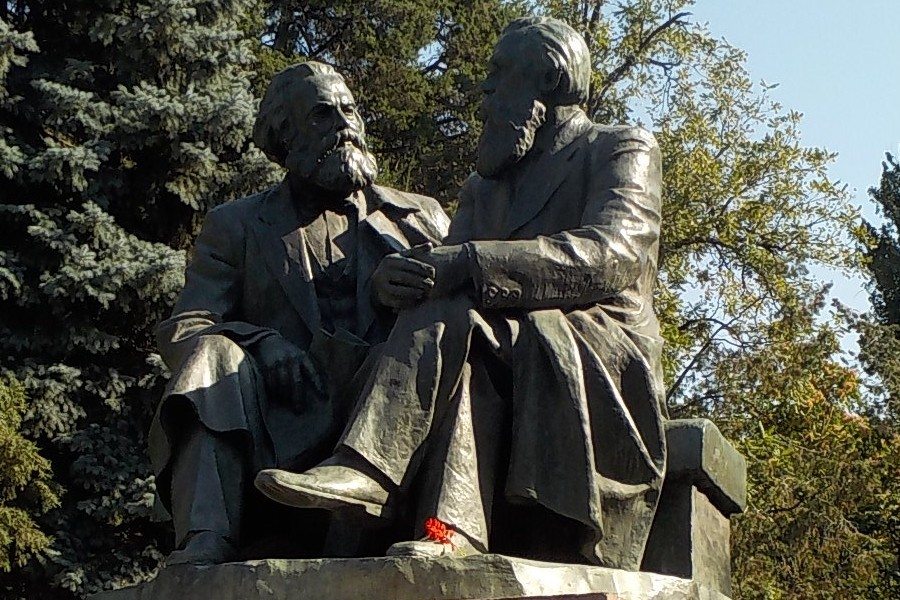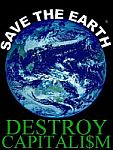
Emneliste om Karl Marx’ og Friedrich Engels’ forhold til miljø og økologi. I en række indlæg diskuterer marxister her betydningen af, hvad de skrev og tilbageviser beskyldningen om, at de ikke beskæftigede sig med miljøet og dets betydning.
Bjarne A. Frandsen. 2008-
Indhold

Se også på Socialistiske Bibliotek:
- Emneoversigten: Klima & Miljø / Climate & Environment
- Emnelisten: Klimaet og den globale opvarmning / Climate & global warming (2008/2019)
- Emneoversigten: Marxisme / Marxism
- Linkboxen: Karl Marx 200 (2018)
På dansk (og norsk/svensk)
Djøfbladet
- Jagten på den sande Marx sendte Kohei Saito til Berlin. Det, han fandt, overraskede ham. (23. oktober 2024). Casper Ravnsted-Larsen interviewer Kohei Saito ifm. hans bog Marx i den antropocæne tidsalder (Djøf Forlag, 2024, 300 s.):
“Øko-marxisme-berømtheden Kohei Saito er blevet oversat til dansk, og han fortæller her, hvordan hans karriere blev formet af brutale begivenheder og glemte notesbøger.”
Eftertryk
- Marx og modvækst. Af Kristoffer Balslev Willert, Martin Hauberg-Lund Laugesen og Martin Karlsson Pedersen (Eftertrykket.dk, “Den japanske økomarxist Kohei Saito er blevet lidt af en international stjerne på venstrefløjen og i modvækstbevægelsen. I 2024 udkom hans bog Slow Down på engelsk, som har solgt over en halv million eksemplarer i Japan, siden den udkom i 2020. For nylig var han i Danmark for at præsentere sin originale og opbyggelige læsning af Marx under overskriften modvækstskommunisme.”
Institut for Marxistisk Analyse
- Rolf Czeskleba-Dupont: Nu på dansk: Kohei Saito’s Marx i den antropocæne tidsalder (“Nogle gange bliver man overrasket over hvorfra marxismen får en hjælpende hånd. I Danmark skulle det åbenbart være Djøfs forlag der kom med oversættelsen af Kohei Saitos Marx i den antropocæne tidsalder, som internationalt har fået fænomenale anmeldelser.”
Magasinet Arbejderen
- Anita Waters: Marx om brud på stofskiftet: Hvordan kapitalismen afskærer os fra naturen (nr.5, 2021; online på Arbejderen.dk)
“Kapitalismens ødelæggelse af forholdet mellem natur og menneske er ikke et nyt problem. Marx havde allerede i det nittende århundrede fokus på problemet. Han mente, at kun ændringen af de sociale relationer kunne hele bruddet. Med andre ord kunne det kun løses under et socialistisk samfund.”
Socialistisk Information
- Svend Vestergaard Jensen: Om Marx, naturen og miljøet (nr.233, marts 2010, s.32-37)
“Mange tror, at den klassiske marxisme repræsenterer en uhæmmet vækstbegejstring uden gnist af økologisk forståelse. Det er faktisk helt forkert, forklarer Svend Vestergaard Jensen i disse noter om marxismen og forholdet til naturgrundlaget.” - John Bellamy Foster: Det Kommunistiske Manifest: et anti-økologisk kampskrift? (nr.118, april 1998, s.28-29)
“Eller grundlaget for en forståelse af menneskets vekselvirkning med naturen.”
Solidaritet
- Marx bliver gjort mere miljøbevidst i Japan (16. september 2024)
“Den japanske marxist, Kōhei Saitō, er bl.a. kendt for sin bestseller-bog Marx og det antropocæne, der netop er udkommet på dansk [Marx i den antropocæne tidsalder, Djøf Forlag, 2024, 300 s.]. Kritisk Revy bringer i den anledning et interview fra New Left Review med Saitō.”
- Karl Marx: Kommunist, revolutionær… miljøforkæmper? (28. august 2919)
“Kohei Saito, der vandt Deutscher-prisen i 2018, taler i dette interview med Ian Angus om Karl Marx’ radikale forståelse af kapitalismen: Som en dødelig disruption af naturens universelle stofskifte.” - John Bellamy Foster: Marx og den globale miljøkrise (nr.1, februar 2008)
“Det er almindeligt at betragte marxismen som en miljøfjendtlig filosofi. Men i virkeligheden var Marx og Engels pionerer inden for den økologiske tænkning, forklarer tidsskriftet Monthly Reviews redaktør John Bellamy Foster i denne artikel.” Artiklen er også bragt i Socialistisk Arbejderavis (nr.280, 3. juli 2008) - Terie Valen: Marxisme og økologi (nr.1, marts 2001). Anmeldelse af John Bellamy Fosters bog Marx’ Ecology: Materialism and Nature (Monthly Review Press, 2000). Artiklen er p.t. ikke online.
Gnist/Rødt: Marxistisk Tidsskrift
- Kapital og natur. Eit intervju med Paul Burkett av Joao Aguiar (nr.2, 2008)
“I strid med mange tolkingar studerte og inkluderte Marx ei økologisk analyse i Kapitalen.”
Tidssignal
- Michael Löwy: Från Marx och Engels till ekosocialism (pdf) (nr.11, 2010, online på Marxistarkiv.se)
“Marxismens pionjärer var inte alls omedvetna om miljöfrågor – tvärtom! Även om de givetvis inte kunde förutse alla problem.”
På engelsk
Against the Current
- Michael Löwy: On Marx and Ecosocialism (No.201, July-August 2019). Review of Kohei Saito, Karl Marx’s Ecosocialism: Capitalism, Nature, and the Unfinished Critique of Political Economy (Monthly Review Press, 2017, 308 p.)
“Kohei Saito is a young Japanese Marxist scholar who belongs to this important eco-marxist school. His book, published by Monthly Review Press, is a very valuable contribution to the reassessment of the Marxian heritage, from an ecosocialist perspective.” - Michael Livingston: Marx on the planet (No.113, November-December 2004 ). Review of John Bellamy Foster, Marx’s Ecology: Materialism and Nature (Monthly Review Press, 2000)
- Michael Löwy: Marx’s Ecology: recovered legacy (No.194, May-June 2018)
“While mainstream ecological theory has been dismissive of Karl Marx, serious research in recent decades has recovered some of his very important insights on ecological issues.” - John Bellamy Foster: Nature and the Communist Manifesto (No.72, January-February 1998)
“Most contemporary commentators on Marx and Engels and the environment have been highly critical of the founders of historical materialism.”
American Journal of Sociology
- John Bellamy Foster: Marx’s theory of metabolic rift: Classical foundations for environmental sociology (pdf) (Vol.105, No.2, September 1999, p.366-405; online at Johnbellamyfoster.org)
“This article addresses a paradox: on the one hand, environmental sociology, as currently developed, is closely associated with the thesis that the classical sociological tradition is devoid of systematic insights into environmental problems; on the other hand, evidence of crucial classical contributions in this area, particularly in Marx, but also in Weber, Durkheim, and others, is too abundant to be convincingly denied.”
Black Pepper Books
- Marx & Ecology
(Calicut, Black Pepper Books, December 2013, 119 p.)
Collection of essays by John Bellamy Foster, p.5-65 (Monthly Review 2013 + 2011) + Michael Malkin, p.66-119 (Weekly Worker, 2000)
Climate & Capitalism
- Essential books on Marxism and Ecology. By Ian Angus (November 10, 2017)
“The following list does not pretend to be complete. I could easily double or triple the number of titles without covering the field, but I’ve tried to keep it to a manageable length. With one exception, all were published in the past 20 years.”
Counterfire
- Elaine Graham-Leigh: The Robbery of Nature: Capitalism and the Ecological Rift (September 30, 2021). Review of John Bellamy Foster and Brett Clark’s book (Monthly Review Press, 2020, 384 p.)
“[The book] raises important questions about means and strategy for solving the ecological crisis, and the role of work in society.” - Dominic Alexander: The Return of Nature: Socialism and Ecology (April 22, 2021). Review of John Bellamy Foster’s book (Monthly Review, 2021, 687 p.)
“[The book] shows that ecological science and socialism have developed together from Marx and Engels’ writings.”
See also review by Keishia Taylor (Socialist Alternative, December 27, 2020) + The invention of tradition on Marxist ecology. By Paul Vernadsky (Solidarity & Workers’ Liberty, Issue 619, 12 January 2022). “The book is well written, informative, readable and advances our understanding in many respects. However it is flawed in a crucial sense: its proports to invent a tradition of ecological Marxism that ignores the damaging effects of Stalinism …”
Ecologist
- The emergence of an ecological Karl Marx: 1818-2018 (5 May 2018)
“Here, Gareth Dale, an editor of the book Green Growth, examines Marx’s own claims about nature and society – and our original interpretation of them.”
Freedom Socialist
- Marx and Engels on ecology (Vol.26, No.6, December 2005-January 2006)
“The slander that Marxism has little to say about the environment persists. In reality, Karl Marx and Frederick Engels addressed these concerns in nearly everything they wrote … What follows is only a small selection of their writing on the subject.”
Historical Materialism
- Kohei Saito: Marx’s theory of metabolism in the age of global ecological crisis (Vol.28, No.2, May 2020, p.3-24; online at Internet Archive)
“In order to highlight the contemporary importance of Marx’s theory of metabolism after its long suppression in the twentieth century, this paper aims at classifying the three different levels of Marx’s concept of ‘metabolic rift’, which also entails clarifying three different levels of ‘metabolic shift’ as the theoretical foundation for updating Marx’s theory of postcapitalism in the age of global ecological crisis.” - Paul Burkett and John Bellamy Foster: The Podolinsky myth: An obituary. Introduction to Sergei Podolinsky, ‘Human Labour and Unity of Force’ (pdf) (Vol.16, No.1, 2008, p.115-161;; online at Johnbellamyfoster.org)
“The relationship between Marxism and ecology has been sullied by Martinez-Alier’s influential interpretation of Engels’s reaction to the agricultural energetics of Sergei Podolinsky.”
International Socialism
- John Bellamy Foster: Marx’s ecology in historical perspective (Issue 96, Autumn 2002, p.71-86)
“JB Foster draws on his excellent recent book, Marx’s Ecology, in order to give a devasting reply to those who argue that Marx and the Marxist tradition have had little to say on environmental and ecological issues.” See also review of J.B. Foster’s book in Socialist Review (Issue 244, September 2000; online at Internet Archive), scroll down.
International Socialist Review
- Elizabeth Terzakis: Marx and nature: Why we need Marx now more than ever (Issue 109, Summer 2018)
“The bottom line is that Marx offers an explanation of and a solution to ecological crisis: capitalism prefigures ecological doom and must be abolished.” - Chris Williams: Marxism and ecology (Issue 105, Summer 2017, p.158-161)
Review of John Bellamy Foster and Paul Burkett, Marx and the Earth: An Anti-Critique (Haymarket Books, 2017, 316 p.)
“[The book] offers a fascinating portrait of Marx and Engel’s thinking on ecological Marxism, successfully refutes the criticism made by recent ecosocialist detractors …”
See also review by Elaine Graham-Leigh: Marx the ecologist (Counterfire, March 8, 2018) + review by Paul Vernadsky: Marx and the environment (Solidarity & Workers’ Liberty, Issue 520, 9 October 2019).
Irish Marxist Review
- Mark Walsh: Marx, Engels, and metabolic rift (Vol.9, No.28, p.35-42)
“Far from being ambivalent about nature, Marx and Engels in fact had a profoundly nuanced and holistic understanding of hu-manity’s place in the natural world.”
Jacobin
- Matt Huber and Leigh Phillips: Kohei Saito’s ‘start from scratch’ degrowth communism (March 9, 2024)
“Kohei Saito’s degrowth rewrite of Marxist theory is not only incorrect — if taken seriously, it would lead to political disaster for both the socialist left and the environmental movement.”
Karl Marx’s Grundrisse
Edited by Marcelo Musto (Routledge, 2008, p.93-106; online at Johnbellamyfoster.org)
- John Bellamy Foster: Marx’s Grundrisse and the ecological contradictions of capitalism (pdf)
“Recent research has revealed that an ecological–materialist critique was
embedded in all of Marx’s work … The Grundrisse has therefore become an indispensable means of unifying Marx’s overall analysis. It not only stands chronologically between his early writings and Capital, but also constitutes a conceptual bridge between the two.”
Marx & Philosophy Review of Book
- Tim Christiaens: Marx in the Anthropocene: Towards the Idea of Degrowth Communism (27 February 2023)
Review of Kohei Saito’s book (Cambridge University Press, 2023, 276 p.)
“[The book] moves from scholarly Marx exegesis to a theoretical confrontation with other strands of contemporary Marxist scholarship. Saito links his approach to John Bellamy Foster’s metabolic rift theory from the 2000s and defends it against, among others, post-humanist theories of the Anthropocene (Latour, Moore), Marxist social constructivism (Smith, Castree) and prophecies about fully automated communism (Bastani, Srnicek).” See more reviews:
Feyzi Ismail: Marx in the Anthropecene (Counterfire, 23 May 2024). “Kohei Saito’s thesis that Marx was a ‘degrowth communist’ is mistaken on theoretical grounds, but also offers nothing in terms of political strategy.”
Daniel Tanuro: Marx, Communism and degrowth (International Viewpoint, 21 March 2024)
Gareth Dale: Marxism for the age of climate emergency: On Kohei Saito’s degrowth communism (Spectre, March 22, 2023)
Paul Hampton: Saito: making a mess of Marxist ecology (Workers’ Liberty, 21 March 2023)
Peter Boyle: Degrowth communism: Marx’s last breakthrough (Climate & Capitalism, June 23, 2023)
David Schwartzman: Critical comments on Kohei Saito’s view of ‘degrowth communism’ (Climate & Capitalism, June 25, 2023)
Rafael Bernabe: Saito, Marx and the Anthropocene (Against the Current, Issue 225, July-August 2023)
Padraic Gibson and Martin Empson: Karl Marx’s “degrowth communism”? (International Socialism, Issue 180, Autumn 2023)
Rafael Bernabe: Saito, Marx and the Anthropocene (International Viewpoint, 27 February 2024)
Brian M. Napoletano: Was Karl Marx a Degrowth Communist? (Monthly Review, Vol.76, No.2, June 2024)
+ Matt Huber and Leigh Phillips: Kohei Saito’s “Start from scratch” degrowth Communism (Jacobin, March 9, 2024).
- Gus Fagan: Marx-Engels-Gesamtausgabe (12 August 2019)
Review of Teinosuke Otani, Kohei Saito and Timm Graßmann (eds),
Marx-Engels-Gesamtausgabe, IV, Band 18, Exzerpte und Notizen, 1864-1872 (De Gruyter, 2019, 1294 p.)
“Was Marx an ecologist and does Marx’s theory offer a coherent theoretical and practical approach for ecologists in the 21st century? The publication of Marx’s excerpts and notes on ecology from the mid-1860s may help to answer that question.” - Steve Knight: Karl Marx’s Ecosocialism (19 January 2018)
Review of Kohei Saito, Karl Marx’s Ecosocialism: Capital, Nature, and the Unfinished Critique of Political Economy (Monthly Review Press, 2017, 308 p.)
“Kohei Saito provides an intellectually rigorous, yet accessible, guide for readers not only as to why healing capital’s ecological rifts was essential to Marx’s socialist project, but also how Marx’s decades-long reading project in the natural sciences …”
See more reviews:
Paul Burkett: Some notes on Kohei Saito’s Karl Marx’ Ecosocialism (Climate & Capitalism, January 8, 2018)
Elaine Graham-Leigh: Marx the ecologist (Counterfire, March 8, 2018)
Hannah Holleman: Marx’s essential contribution to ecosocialism (International Socialist Review, Issue 108, Spring 2018)
Martin Empson: Marx’s ecological education (Monthly Review, Vol.69, No.11, April 2018) Michael Löwy: On Marx and Ecosocialism (Against the Current, Issue 201, July-August 2019)
Camilla Royle: Marx and the robbery of the soil and the worker (International Socialism, Issue 163, Summer 2019)
Paul Hampton: Marx, ecology, and science (Solidarity & Workers’ Liberty, Issue 523, 30 October 2019)
Rafael Bernabe: Saito, Marx and the Anthropocene (International Viewpoint, 27 February 2024)
Brian M. Napoletano: Was Karl Marx a Degrowth Communist? (Monthly Review, Vol.76, No.2, June 2024)
+ interview med Kohei Saito: Karl Marx: Kommunist, revolutionær… miljøforkæmper? (Solidaritet.dk, 28. august 2919)
+ Matt Huber and Leigh Phillips: Kohei Saito’s “Start from scratch” degrowth Communism (Jacobin, March 9, 2024).
Marxist Left Review
- Green growth, degrowth and a humanist Marxism (Issue 27, Autumn 2024)
“Liam Kruger examines the history and politics of degrowth theory and critiques attempts to synthesise degrowth and Marxism, arguing that they are fundamentally incompatible. He discusses science and labour under capitalism, and contends that a Marxist vision for a communist future is one motivated by freedom, not degrowth.”
Monthly Review
- Subject: Marxist Ecology
- Engels and the second foundation of Marxism (Vol.75, No.2, June 2023)
“Historical materialism, in the dominant twentieth-century narrative in the West, is understood as confined to social sciences and humanities. However, John Bellamy Foster writes, Marx and Engels did not have such a limited conception, instead engaging with the natural sciences, providing insight into the dialectics of nature.” - Paul Blackledge: Engels’s ecologically indispensable if incomplete dialectics of nature (Vol.72, No.11, April 2021)
Review of Kaan Kangal, Friedrich Engels and the Dialectics of Nature (Palgrave Macmillan, 2020, 213 p.)
“Kangal has made an important contribution to this project and it behooves us to read his work to help overcome the remaining lacunae in Engels’s thought as part of the struggle for a coherent ecological alternative to capitalism’s destruction of our environment.” See also review by Vesa Oittinen (Marx & Philosophy Review of Books, 15 December 2020) + review by Camilla Royle: Engels: the enemy within? (International Socialism, Issue 172, Autumn 2021, p.217-221). - The return of nature and Marx’s ecology (Vol.72, No.7, December 2020)
“In an interview with Alejandro Pedregal, John Bellamy Foster tells us about the paths great ecosocialist thinkers traveled, the most prominent debates in current Marxist ecological thought, and the urgent need for a project that transcends the conditions that threaten the existence of our planet today - John Bellamy Foster and Brett Clark: The rift of Éire (Vol.72, No.7, April 2020). This article is taken from chapter 2 of Foster and Clark’s, The Robbery of Nature: Capitalism and the Ecological Rift (Monthly Review Press, 2020, 384 p.)
“… it is in relation to the analysis of the systematic disruption of the Irish environment that Marx’s ecological inquiries can be seen as taking on a concrete and developed form, encompassing the ecological as well as economic robbery that characterized the Irish colonial regime.”
See Elaine Graham-Leigh’s review of the book (Counterfire, September 30, 2021) + review by Brendan Cooney: A metabolic mess: a critique (Marxist-Humanist Initiative, April 28, 2022). - John Bellamy Foster and Brett Clark: The robbery of nature: Capitalism and the Metabolic Rift (Vol.70, No.3, Summer 2018)
“Marx’s notion of ‘the robbery of the soil’ is intrinsically connected to the rift in the metabolism between human beings and the earth.” - John Bellamy Foster: Marx, value, and nature (Vol.70, No.3, Summer 2018)
“In recent years ecological critiques of capitalism have deepened and multiplied, resulting in new debates over the conception, scope, and purpose of Marx’s value theory and its relation to the natural world.” - John Bellamy Foster and Brett Clark: Marx’s Ecology and the Left (Vol.68, No.2, June 2016)
“… the notion of Marx’s anti-ecological perspective became deeply rooted in Western Marxism … Surveying this history, we will examine the debates on Marxian ecology that have emerged within the left …” - Kohei Saito: Marx’s Ecological Notebooks (Vol.67, No.9, February 2016)
“Looking at the notebooks after 1868, one can immediately recognize the rapid expansion of Marx’s ecological interests.” - John Bellamy Foster: Paul Burkett’s Marx and Nature fifteen years after (Vol.66, No.7, December 2014)
“Foreword to the second edition of Paul Burkett, Marx and Nature: A Red and Green Perspective (Haymarket, 2014, 309 p.) - Kohei Saito: The emergence of Marx’s critique of modern agriculture: Ecological insights from his Excerpt Notebooks (Vol.66, No.5, October 2014)
“Examining Marx’s excerpts cautiously, one realizes that he first attained a truly critical and ecological comprehension of modern agriculture, that goes beyond the paradigm of the Ricardian theory of differential rent, in the middle of the 1860s.” - John Bellamy Foster: The ecology of Marxian political economy (Vol.63, No.4, September 2011)
“In the following analysis, therefore, I will discuss not only the ecological critique provided by Marx (and Engels), but also that of later Marxian and radical political economists …” - Paul Burkett: Marx’s vision of sustainable human development (Vol.57, No.5, October 2005)
“The suggestion that Marx’s communism can inform the struggle for more healthy, sustainable, and liberating forms of human development may seem paradoxical in light of various ecological criticisms of Marx that have become so fashionable over the last several decades.” - John Bellamy Foster: Marx’s ecological value analysis (Vol.52, No.4, September 2000). Review of Paul Burkett, Marx and Nature: A Red and Green Perspective (MacMillan, 1999)
- John Bellamy Foster: Marx and the environment (Vol.47, No.3, July-August, 1995). Only abstract online.
“It has become fashionable in recent years, in the words of one critic, to identify the growth of ecological consciousness with ‘the current postmodernist interrogation of the metanarrative of the Enlightenment’ … Nowhere is this fashion more evident than in certain criticisms directed at Marx and Engels.”
MR Online
- John Bellamy Foster: Marx and the global environmental rift (November 28, 2007)
“Ecology is often seen as a recent invention. But the idea that capitalism degrades the environment in a way that disproportionately affects the poor and the colonized was already expressed in the nineteenth century in the work of Karl Marx and Frederick Engels.” - Capital and Nature: An interview with Paul Burkett (April 24, 2007)
“Contrary to many interpretations, Marx studied and included an ecological analysis in Capital.”
New Politics
- From Karl Marx to Eco-Marxism (Issue 77, Summer 2024)
“Michael Löwy argues that Marx’s thought has deep ecological significance, such as his theory of the ‘realm of freedom'”.
Organization & Environment
- Paul Burkett and John Bellamy Foster: Classical Marxism and the second law of thermodynamics: Marx/Engels, the heat death of the universe theory, and the origins of ecological economics (pdf) (Vol.21, No.1, March 2008, p.1-35; online at Johnbellamyfoster.org)
“This opens the way to the recognition that Marx’s political economy was unique in the 19th century in incorporating thermodynamics into the core of its analysis, thus providing the foundations for an ecological economics.” - Brett Clark and John Bellamy Foster: The environmental conditions of the working class (pdf) (Vol.19, No.3, September 2006, p.375-88; online at Johnbellamyfoster.org). An introduction to selections from Frederick Engels’s The Condition of the Working Class in England in 1844.
“For Engels [the book] was to be the first of a series of connected analyses of ecology that stretched through more than half a century … making him one of the most important but underappreciated contributors to the development of environmental thought.” - John Bellamy Foster: The crisis of the earth: Marx’s theory of ecological sustainability as a nature-imposed necessity for human production (pdf) (Vol.10, No.3, September 1997, p.280-297; online at Johnbellamyfoster.org)
“The literature on Marx and the environment is voluminous, reflecting the wide range of disagreement, the theoretical complexity of the issues involved, and – above all – the high stakes associated with the the ecological evaluation of Marx’s thought.”
Rebel
- Mark Walsh: Marx, Engels and metabolic rift. Part 1-2 (October 20-21, 2020)
“In contrast to the misconception that Marx and Engels were only concerned about economics, Mark Walsh highlights how they in fact had plenty to say about environmental degradation, focusing in particular on the notion of a metabolic rift. Part 2 explores the impact of the metabolic rift over the 20th century.”
Socialist Register
- John Bellamy Foster: The Communist Manifesto and the environment (Merlin Press/Monthly Review Press, 1998, p.169-189)
“To what extent is the Manifesto – arguably the most influential political pamphlet of all time – compatible with ecological values, as we understand them today? Moreover, how is the Manifesto to be situated within the rest of Marx and Engels’ thought in this respect?”
Socialist Worker
- John Bellamy Foster: Marx and ecology (Issue 2080, 8 December 2007)
“Karl Marx’s analysis of the environment under capitalism shows how saving the planet is inextricably linked to transforming our society.”
Synthesis/Regeneration
- Book review by Tom Smith (Issue 23, Fall 2000):
James [i.e. John] Bellamy Foster: Marx’s Ecology (New York, Monthly Review Press, 2000)
Paul Burkett: Marx and Nature (New York, St. Martin’s Press, 1999)
“Many ‘populist’ writers still condemn Marx for his alleged ‘Promethean’ faith in technological progress. Many ‘Marxists’ agree – and accept the charge proudly. For them, workers’ control will merely ensure that even heretofore-dangerous technologies-nuclear power, for example – will become safe. Even such ‘social ecologists’ as Murray Bookchin accept this view of Marx’s concept of ecology and progress. Foster’s and Burkett’s books thoroughly debunk this belief.”
Theory and Society
- Paul Burkett and John Bellamy Foster: Metabolism, energy, and entropy in Marx’s critique of political economy: Beyond the Podolinsky myth (pdf) (Vol.35, No.1, February 2006, p.109-56). Only abstract online.
“Building on an earlier analysis of Marx’s and Engels’s response to Podolinsky, this article shows that they relied on an open-system, metabolic-energetic model that adhered to all of the main strictures of ecological economics – but one that also (unlike ecological economics) rooted the violation of solar and other environmental-sustainability conditions in the class relations of capitalist society.”
Weekly Worker
- Chris Gray: Arguing against the wrong ‘Marxism’ (Issue 1315, 17 September 2020)
“Despite commonly believed myths, Marx and Engels saw human emancipation as linked to the protection and enhancement of nature.” - Marx and ecology, Part 1 (Issue 349, August 31, 2000) + Part 2 (Issue 350, September 7, 2000) + Part 3 (Issue 352, September 21, 2000)
“Michael Malkin examines the relationship between humanity and nature in the thought of Karl Marx.”
World Review of Political Economy
- Brett Clark and John Bellamy Foster: Marx’s ecology in the 21st century (Vol.1, No.1, March 2010, p.142-56). Only abstract online.
“Thus Marx’s ecology in the eyes of some green left and even ecosocialist thinkers is largely irrelevant to 21st-century conditions … Our argument is radically different. We contend that Marx’s materialist and metabolic approach … provide an invaluable methodological foundation to critique contemporary environmental degradation and to envision social and ecological transformation.”
Se også:
Metabolic Rift (Monthly Review, October 16, 2013, updated July 6, 2020)
A selected bibliography by Ryan Wishart, R. Jamil Jonna and Jordan Besek.
Degrowth and Marxism. By Martin Empson (International Socialism, Issue 183, Summer 2024, 111-144). “This article intends to demystify the ideas put forward by some proponents of degrowth in order to defend them from some cruder critiques.”
20 essential books on Marxist ecology. By Ian Angus (Climate & Capitalism, July 27, 2019) “I’ve limited the list to books that are in print and readily available. I’ve avoided academic texts, and books that aren’t clearly Marxist. There are many good non-Marxist books, of course, but this is a Marxist reading list!”
Revolutionary reflections: ‘Green Capitalism’: a critical review of the literature. Part 1-3 (RS21: Revolutionary Socialism in the 21st Century, 15-16 March 2019, 34 p.)
“Stephen Graham dissects the discourses of sustainability, Green capitalism and the Green economy.”
Økologi og marxisme: en læseguide af Andreas Malm. Af Vibeke Nielsen (Solidaritet.dk, 18. september 2019)
“Den svenske økosocialist og forsker, Andreas Malm, har lavet en linksamling med anbefalinger til litteratur om klimakrisen.” With link to Reading Guide: Ecology & Marxism (Historical Materialism, 2017).
Finn Kjeller (red.): Økosocialisme: fra systemkritik til alternativ (Solidaritet, 2015, 245 s.) Hele bogen online på Økosocialisme.dk (+ anmeldelser og forfatter-videoer).
“Antologien samler bidrag fra engagerede forskere og fagforeningsfolk fra otte forskellige lande: Richard Smith, Daniel Tanuro, Michael Löwy, Pat Devine, Asbjørn Wahl, Nathalie Guay, Lars Hendriksson og Søren Kolstrup.”
Socialistisk guide for miljøaktive. Af Anders Bjerre Mikkelsen (Arbejderen.dk, 2. maj 2016). Anmeldelse af Fred Magdoff og John Bellamy Foster: Hvad enhver miljøforkæmper behøver at vide om kapitalisme (Solidaritet, 2015, 207 s.) “Hvorfor støder en nødvendig kamp for en bæredygtig verden på modstand. Hvorfor er det, der faktisk gøres, helt ude af proportion med problemerne?”
En økologisk-social revolution (Solidaritet, nr.4, december 2009, s.14-22; online på Lars Henrik Carskov Blog)
“Nutidens økologiske krise udspringer af kapitalens voldsomme ekspansion ind på alle livets områder. En økologisk omstilling indebærer derfor også et opgør med det kapitalistiske system af global irrationalitet. Det skriver John Bellamy Foster i dette uddrag fra sin seneste bog The Ecological Revolution: Making Peace with the Planet (2009, kap. 13, s.253-264).”
Simon Butler: Økologi og socialisme – to uadskillelige revolutioner (Socialistisk Information, 2. september 2009). “En løsning på den økologiske krise er nu enten revolutionær eller falsk, hævder John Bellamy Foster i sin nye bog, The Ecological Revolution: Making Peace with the Planet (Monthly Review Press, 2009).
John Bellamy Foster: Økologi og overgangen fra kapitalisme til socialisme (pdf) (Det Ny Clarté, nr.10, maj 2009, s.42-49). Scroll ned.
“Socialismen har siden sin oprindelse været optaget af økologisk bæredygtighed. Den er insisterende i sin kritiske analyse af markedets vækstfilosofi og dets fremmedgørelse fra naturen.”
John Bellamy Foster: Peak oil – om topp i oljeproduksjonen og energiimperialisme (Gnist/Rødt, nr.2, 2009)
“Framveksten av open militarisme og imperialisme ved starten på det tjueførste hundreåret har stort sett si årsak i forsøk frå dei dominerande kreftene i verdsøkonomien på å vinne kontroll over dei minkande oljeforsyningane i verda.”
John Bellamy Foster: Ødeleggelsens økologi (Gnist/Rødt, nr.2a, 2007)
“Jeg vil starte denne analysen av det jeg kaller ‘ødeleggelsens økologi’ med å referere til Gillo Pontecorvos film Brenn / Queimada fra 1969.”





























